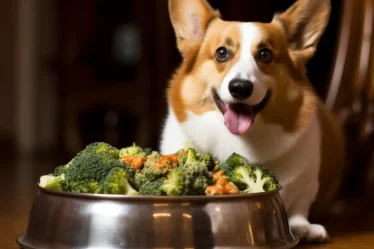
Our beloved corgis bring us years of joy and companionship, but as they age, their nutritional needs change. Just like us, senior dogs have different dietary requirements than their younger counterparts. Knowing what to feed your senior corgi can help them stay healthy and happy in their golden years.
Special Considerations for Senior Corgis
Several key factors to consider when feeding your senior corgi:
- Decreased metabolism: As dogs age, their metabolism slows down, so they need fewer calories to maintain a healthy weight. Feeding them the same amount of food they ate as puppies can lead to obesity, which can put a strain on their joints and worsen other health problems.
- Kidney health: Kidney disease is a common concern in older dogs, including corgis. A senior corgi diet should be lower in protein and phosphorus to help protect their kidneys.
- Dental health: Dental problems are also more common in older dogs. Choose a food that is easy to chew and helps to promote good dental health.
- Joint health: Obesity can exacerbate joint problems in corgis, which are already prone to conditions like arthritis. A senior corgi diet should be formulated to support joint health with glucosamine, chondroitin, and other nutrients.
Kidney-Friendly Diet for Senior Corgis
If your corgi has been diagnosed with kidney disease, your veterinarian will likely recommend a special kidney-friendly diet. These diets are typically lower in protein, phosphorus, and sodium, and they may also contain other nutrients that can help to support kidney function.
Importance of Maintaining a Healthy Weight
Being overweight can have a significant impact on a senior corgi’s health and well-being. Excess weight puts strain on their joints, heart, and lungs, and it can also make it more difficult for them to move around. Keeping your senior corgi at a healthy weight is one of the best things you can do for their health and longevity.
Tips for Feeding Your Senior Corgi
Here are some tips for feeding your senior corgi:
- Talk to your veterinarian: Discuss your senior corgi’s individual needs with your veterinarian and get their recommendations for a food that is right for them.
- Start slowly: If you are switching your senior corgi to a new food, do so gradually over a period of 7-10 days to avoid digestive upset.
- Monitor their weight: Weigh your senior corgi regularly and adjust their food intake as needed to maintain a healthy weight.
- Feed smaller meals more often: Senior dogs may have difficulty digesting large meals. Feeding them smaller meals more often can help with digestion and absorption of nutrients.
- Add water to their food: Adding water to your senior corgi’s food can help them stay hydrated, especially if they are eating dry food.
- Warm up their food: Warming up their food can make it more palatable and easier to digest.
By following these tips and working with your veterinarian, you can help your senior corgi enjoy a long and healthy life.
Additional Resources
- The Association for Pet Obesity Prevention: https://www.petobesityprevention.org/
- The National Kidney Foundation: https://www.kidney.org/
- The American Veterinary Medical Association: https://www.avma.org/

